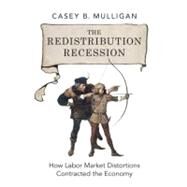The Redistribution Recession How Labor Market Distortions Contracted the Economy
, by Mulligan, Casey B.- ISBN: 9780199942213 | 0199942218
- Cover: Hardcover
- Copyright: 11/2/2012
Since 2007, many fundamental aspects of the economy and the labor market have changed dramatically. With the exception of Medicaid, subsidies flowing to the unemployed and financially distressed households in the forms of loan forgiveness and government transfers almost tripled. The generosity of mean-tested subsidies like food stamps, and employment-tested subsidies like unemployment insurance have steadily increased. Congress considered legislation that would raise marginal income tax rates, and would present Americans with new health benefits that would be phased out as a function of income. Also, a large number of homeowners owed more on their mortgages than their houses were worth, and many in both the private and public sectors renegotiated their mortgage contracts. And many others renegotiated business debts, consumer loans, student loans, and tax debts. Labor economist Casey B. Mulligan argues that because the way these trends have affected the labor market, they deepened, if not caused, the recession. He explains how progressive tax rates and binding minimum-wage laws reduce labor usage, consumption, and investment, and how they increase labor productivity. This means that while a small part of the population actually works more, overall hours worked in the whole economy are less. He explains and examines the pratical ways that for many people during a recession it costs more to earn more, and how people are working less because of it. One newly discovered aspect of the costs on earning is the large portion of the labor force renegotiating debt. Mulligan quantifies how borrowers can expect their earnings to affect the amount that lenders will forgive in debt renegotiation, and how this has acted as a massive implicit tax on earning. He also measures the changes in market tax rates that resulted directly from "social safety net" programs, and quantifies these changes' effects on the labor market and the economy. Mulligan argues that much of the decline in labor usage since 2007 was a reaction to the combination of higher marginal tax rates and a higher federal minimum wage, and that it is important to understand why labor market distortions like these suddenly increased, and to what degree those increases were caused by the various measures enacted to boost the labor market. The Redistribution Recessionis a controversial, clear-cut, and thoroughly researched analysis of the effects of various government policies on the labor market during the recent recession.







